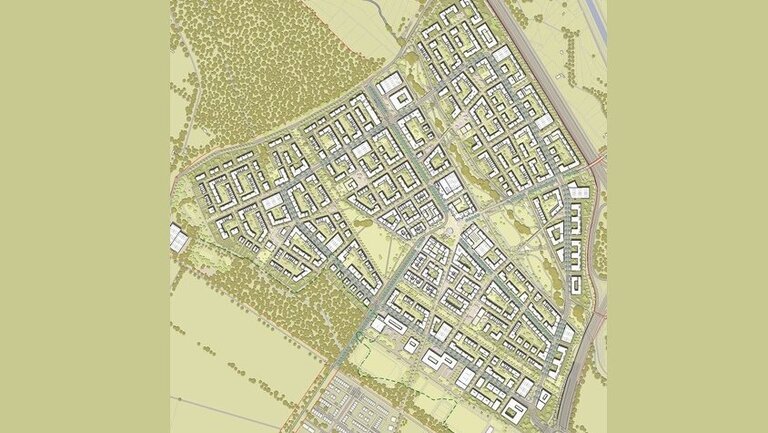Freiburg, Germany, April 23, 2021. 150 soccer pitches – that is roughly the size of the area where the new urban district of Dietenbach is being developed on the western outskirts of the city of Freiburg im Breisgau, Germany. The district is due to be completed by 2042, and the city plans to create 6,900 residential units, about half of them as municipally subsidized rental apartments, for a total of up to 16,000 people. Short distances, green open spaces, schools and kindergartens and a variety of sports facilities and shopping outlets aim to make Dietenbach into a colorful and lively urban district. In addition, the new neighborhood aims to be fully sustainable and climate-neutral.The Stuttgart-based planning and consulting company Drees & Sommer is supporting the city of Freiburg in this project by carrying out financial controls for the urban development process.
The planning and preparations for the new urban district are already in full swing.Which parts of the site will be developed first? How will the urban district be networked? Who should build what for whom? How will Dietenbach be used in future? The project team is currently pursuing these questions intensively and working out the specific development plan step by step. At the end of this year, the first partial development plan is already expected to be ready as a draft.
Professor Dr Rüdiger Engel, Head of the Dietenbach Project Team for the city of Freiburg, comments: ‘Building a new urban district from the drawing board to the construction is an enormous challenge in itself. Keeping an eye on the costs and using the funds properly is the other major task. Therefore, we are pleased that we have found Drees & Sommer as a competent and experienced partner for this project.’ In the framework of the project, the experts at Drees & Sommer are providing services such as the preparation of the cost and financing overview, ongoing budget control and subsidy management, and they also assist in contract award procedures.
The Drees & Sommer team members and the representatives of the city of Freiburg have participated in joint workshops and closely cooperated in order to create a solid basic structure for financial controls in the coming years. ‘This means that we have laid the foundation for a successful financial controls system. However, other factors and parameters in the cost and financing overview are also very important. For example, the goal of ensuring a 50 percent share of affordable residential accommodation could affect the overall cost effectiveness of the development project. Here there are various options, such as including subsidies for rents and the land price, or assigning hereditary building rights for parts of the project.
We can then calculate, compare, present and evaluate the effects which these options have,’ adds Markus Lampe, Drees & Sommer Senior Manager in the Real Estate Consulting division.
Affordable Residential Units and Sustainable Mobility
The development plan, which was completed in December of last year, envisages an urban district with mixed and variable types of use. Affordable and barrier-free living are a special focus. Therefore, about 50 percent of the planned residential units are designated as subsidized rental apartments. The city of Freiburg wishes to implement a variety of building types, including residential hostels, small townhouses and large multistory apartment buildings.
There is also a central focus on the topic of sustainability. The client proposes an intelligent mobility concept to ensure that Dietenbach will become a pedestrian-friendly urban district with restricted car traffic. This will be enhanced by the connection to Freiburg’s tram system, a good network of cycle paths, car sharing and bike sharing services and cargo bike hire systems. In addition, there is an innovative energy concept to make sure that the energy used by the residents is generated in the location and from renewable energy sources. These and other measures aim to ensure the climate neutrality of the new suburb.
The development of the first construction phase comprising more than 1,600 residential units, a primary school, a sports hall and other facilities is scheduled to begin in 2023. The urban district will be constructed in a total of six construction phases.
